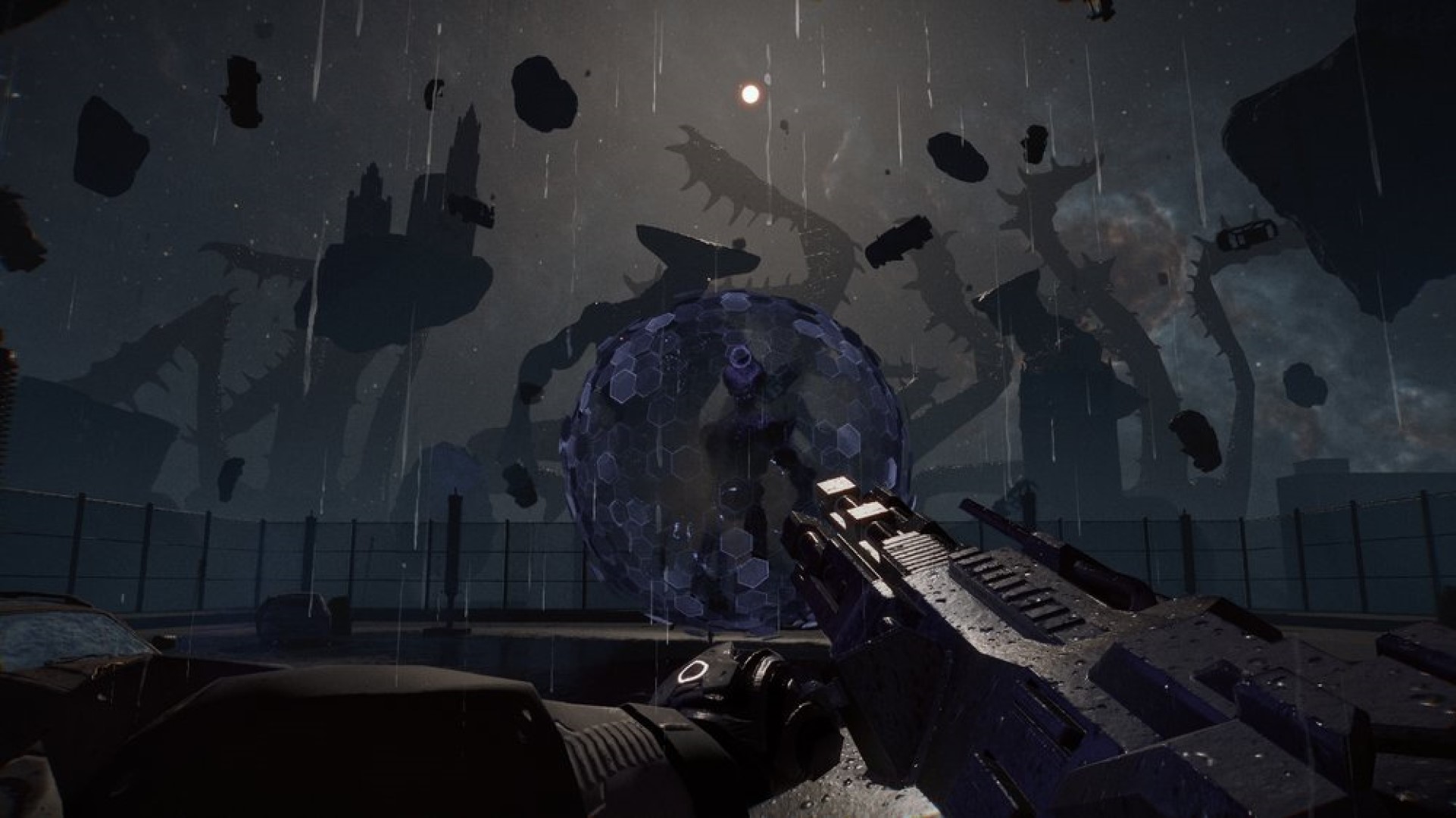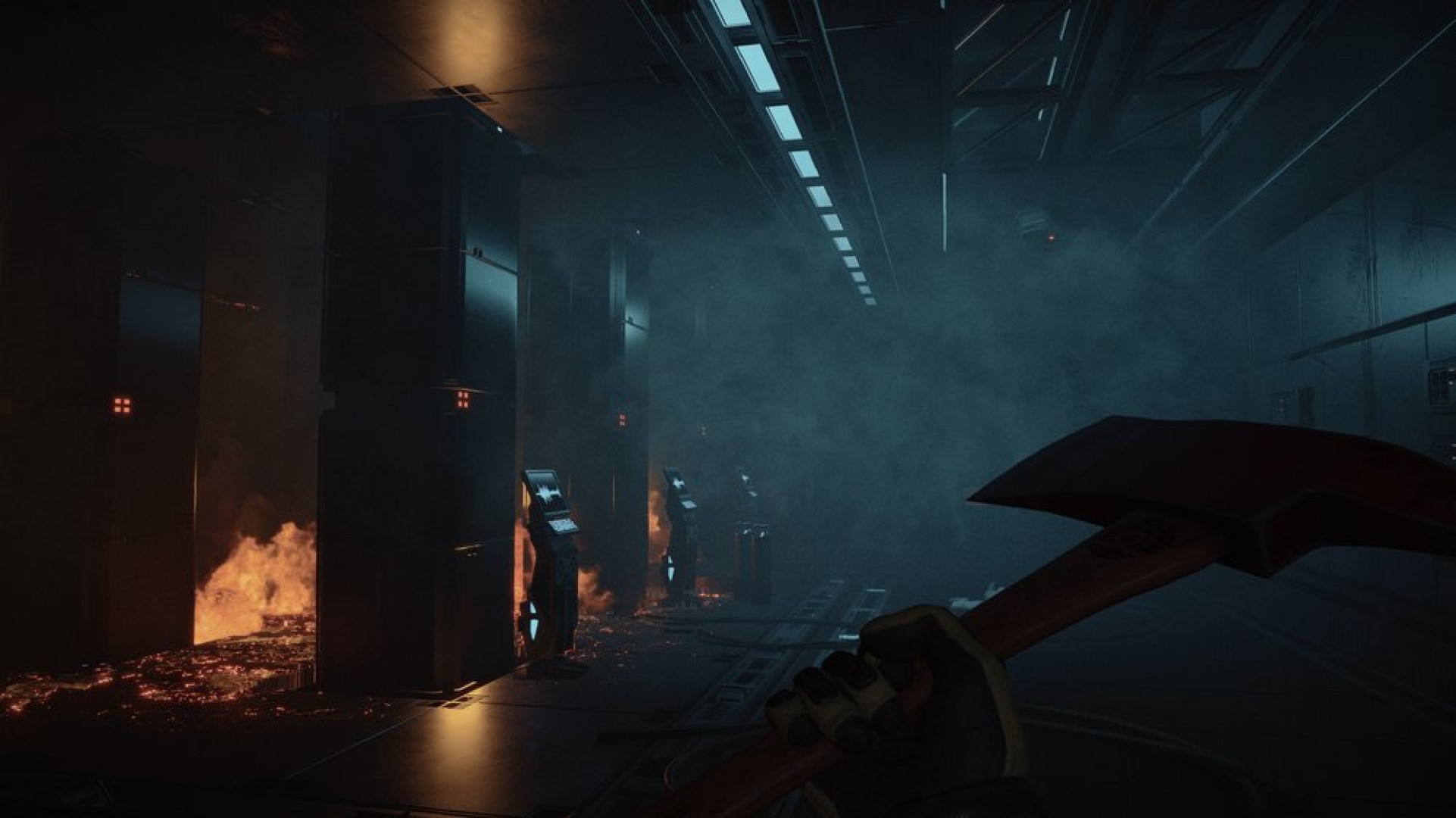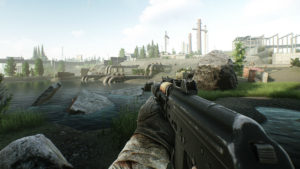
Developer Teamkill Media is a relatively new indie studio, having previously released a single game—Kings of Lorn: Fall of Ebris. Since then, the studio has been working on its most ambitious game—Quantum Error. A genre-bending title that hopes to meld first and third-person action with elements of horror, as well as some unique mechanics revolving around being a firefighter.
"The adaptive triggers are also used quite extensively, both in combat, as well as general exploration as you fight your way through the game’s levels."
Despite its best efforts, however, Quantum Error comes off feeling like the studio is trying to punch well above its weight. Sure, the game has plenty of production value, and the ambition is certainly present, especially when it comes to some of the more unique mechanics it’s trying to employ. Some of these mechanics are quite simple, like a fancier way to open a door. Others can get slightly more in-depth, like having to figure out a way to vent out a room’s heat so that there isn’t lethal backdraft when you open the door. There’s also a strange CPR mechanic which involves quick-time events and blowing into your microphone to revive someone. Sadly, most of the unique mechanics end up feeling more like they’re gimmicks rather than game changing experiences.
Since it was developed primarily with the PS5 in mind, the game makes use of DualSense’ features. The use of these features largely come down to the protagonist’s role as a firefighter. For example, before you open a door, you’ll often have to check whether the room you’re trying to enter is hot enough to cause a backdraft, which would kill you. While feeling for the room’s temperature, Quantum Error makes use of the DualSense controller’s haptics, lightly vibrating the controller on the left side to denote that opening the door will lead to your demise.
The adaptive triggers are also used quite extensively, both in combat, as well as general exploration as you fight your way through the game’s levels. Try to pry open a door, for example, and you’ll feel the DualSense’s adaptive triggers pushing back at you. Similarly, the game’s guns also make use of the triggers to further sell you on the impact of your bullets. Unfortunately, that’s about where the feedback ends with the combat.

"The use of DualSense features largely come down to the protagonist’s role as a firefighter."
The combat in Quantum Error quite honestly feels like its weakest part. The game does itself no favors by giving off a terrible first impression; the prologue has you fighting enemies on the streets of a city as you try and make your way to your team. These streets are teeming with enemies, and the prologue is incredibly stingy with how much ammo you’re going to get. This is further exacerbated by just how easy it is to miss enemies; not only do they have a tendency to unfairly dodge your aim, but getting hit by a bullet also throws your aim all over the place to an absurd degree. Couple this fact with the lack of any real feedback if a bullet actually hits an enemy makes the combat feel like a slog.
Failure also has an incredibly steep price in Quantum Error. Taking the prologue as an example, there are simply no mid-mission checkpoints. Die and you’ll just have to accept it and start over. Thankfully, your second go-around will teach you how scarce ammo can be, and you might even be persuaded into trying out the game’s terrible melee combat. Further into the game, while checkpoints do exist, they also tend to be incredibly far apart. The issues I found with checkpoints also tie in directly with problems in the game’s level design. First and foremost, there’s no real guidance to where you’re supposed to go aside from an objective marker that only really shows up if you’re lucky. There are no in-game maps, no mini-maps, and you’ll often find yourself blindly roaming around and hoping to ultimately fall into your objective by pure luck. Quantum Error also makes liberal use of invisible walls, especially in some of its more open levels. And I’m not talking about having insurmountable debris blocking your way; I’m literally talking about invisible walls like those seen in old PlayStation 2 games.

"The combat in Quantum Error quite honestly feels like its weakest part."
There’s also an incredibly high emphasis on stealth in Quantum Error, which doesn’t really work out too well since you don’t have much of a way to keep a track on enemies, or even track how visible or invisible you are to your foe. Until you get your hands on a gun—something that only really happens a couple of hours into the game—you’re encouraged to sneak up on enemies and take them out with a stealth melee attack. Unfortunately, since it’s much more likely that you’re going to accidentally run into enemies as you turn a corner, you’re going to end up wildly flailing your axe around, hoping for a hit or two that might take the enemy out before more are attracted from all the ruckus you’re creating.
While its gameplay ends up feeling like little more than a rote corridor shooter coupled with the previously mentioned underwhelming gameplay mechanics, just about all of Quantum Error’s ambition is seen in its story. The game is trying to tell an incredibly intricate story that revolves around hopping around in different dimensions and planets, and a shadowy conspiracy that you run into quite early in the game. Unfortunately, the ambition on display seems like it’s well beyond the studio’s reach, since a lot of the impact of the story is lost thanks to incredibly stilted voice acting and wooden character animations. When it comes to cinematics, Quantum Error makes use of camera angles that make them feel like a parody of a serious sci-fi story.
Quantum Error certainly has its moments when it comes to visuals, however. The game is certainly able to nail things when it comes to creating a tense atmosphere, especially during the early firefighter sequences. The game makes excellent use of lighting, especially when it’s coupled with the smoke you inevitably have to deal with when things are on fire and to create a sense of urgency where you’re desperately trying to look for people and save them. It only really falters when it comes to outdoor areas, where it ends up looking like the most generic shooter you could possibly imagine. Just about every outdoor area feels like a brown, dimly lit alley with no real landmark or any other way for a zone to set itself apart, aside from the fact that there might occasionally be a wrecked car or two around and a couple of things on fire every now and then.

"The game is certainly able to nail things when it comes to creating a tense atmosphere"
Ultimately, Quantum Error is a game where the studio seems to have ideas well beyond its capabilities. Where its story and general concept are unique and interesting, it’s all let down by voice acting and cinematic direction that, at the best of times, feels questionable, and at worst is just downright bland and boring.
The best thing about the gameplay in Quantum Error is that it just works. It controls fine, and the DualSense’s adaptive triggers’ implementation is done really well here. Unfortunately, other aspects, like the lack of any real feedback on whether an enemy actually got hit, strange level design decisions, and insistence on stealth in a game that doesn’t really give you any tools to sneak around with drag it all down. The best thing I can ultimately say about Quantum Error is that its story and concepts are at least interesting—even if the story is told in an absolutely terrible way that throws way too many badly directed cinematics at you.
This game was reviewed on the PlayStation 5.
Good use of lighting to create atmosphere; Story’s concept is interesting.
Bad level design; Mediocre combat; Stilted voice acting; Terrible cinematic direction.
















